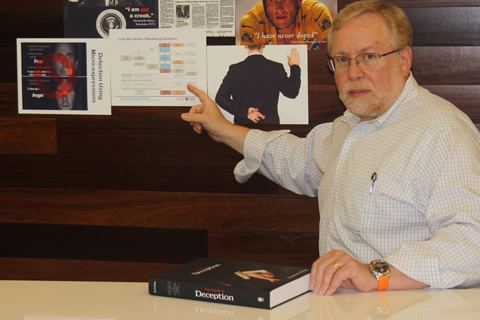
 |
| A majority of lies are told by a small portion of the population, reveals research by Kim Serota, Ph.D., a visiting professor of marketing in OU's School of Business Administration. |
In a national survey of 1,000 U.S. adults, 60 percent of the subjects reported telling no lies at all on a given day, and almost half of all reported lies were told by just five percent of the subjects. The study supports the idea that most people are honest most of the time and that a majority of lies are told by a small group of “prolific liars.”
“There’s a lot of research out there about why people lie and what they lie about, but there’s very little research on how much people lie,” said Dr. Serota, a visiting professor of marketing. “While the average number of lies told is one or two per day, my research found that those lies are not evenly distributed across the total population.”
Building on those findings, which were first published in a 2010 article in Human Communication Research (and recently republished in the SAGE Encyclopedia of Deception), Dr. Serota analyzed data on the lying habits of adults in the United Kingdom. His findings, published earlier this year in the Journal of Language and Social Psychology, found a similar trend among adults in the UK. That is, most lies are told by a small group of prolific liars.
What is a prolific liar?
Through his research analysis, Dr. Serota determined a “break point” for distinguishing between prolific liars and everyday liars. In the U.S., everyday liars tell up to two lies a day, while prolific liars tell more than two lies a day. The numbers are higher in the UK, with everyday liars telling up to four lies per day and prolific liars telling more than four lies a day.
“The distribution of lies follows a pattern referred to as the ‘law of rare events.’ This law tells us the upper limit of normal behavior,” Dr. Serota explained. “The majority of lying fits this pattern. Prolific liars are the people who go beyond the acceptable level. The study results told us that people in the UK have a higher tolerance for lying than we have in America.”
Who is a prolific liar?
According to the data, prolific liars are generally younger, are more likely to be male and have higher occupational status. In fact, senior managers are more likely to be prolific liars than junior managers and non-management employees. This trend opposes the broader finding that people generally tell fewer lies as they get older.
More trends among prolific liars (Based on the UK study)
Dr. Serota’s current projects look at the relationship between the frequency of lying and the ability to detect lies, both interpersonally and in advertising messages.
“Prolific liars are probably not any better at detecting lies than the rest of us – and most of us aren’t very good,” Dr. Serota said. “But we think they are likely to use different detection strategies.”
Read the full study: